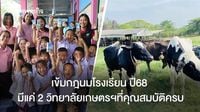Thailand's Cooperative Promotion Department (CPD) has recently clarified the stringent new regulations governing the distribution of school milk for the 2025 academic year, revealing that only two agricultural colleges in the entire country have met the full qualifications required to participate in the program. This revelation has sparked concerns about the future of dairy education and production at other agricultural colleges that have been excluded from the scheme for two consecutive years.
According to Mr. Wisit Srisuwan, Director-General of the CPD, the department is strictly implementing a cabinet resolution dated March 3, 2025, which prioritizes the allocation of school milk distribution rights first to cooperative sector businesses, then to state enterprises, educational institutions, and finally other dairy industry operators. This hierarchy reflects a strategic approach to ensure that the most qualified and reliable producers are selected to supply milk to schools nationwide.
The new criteria for participation in the School Milk Program are comprehensive and exacting. Applicants must provide detailed documentation, including contracts or records of milk purchases and sales, to demonstrate their operational legitimacy. Furthermore, manufacturers must hold several specific certifications and licenses: a factory operating license, a food production license, and GMP 420 certification, which ensures compliance with good manufacturing practices. They must also have GMP/GAP certification verifying the quality and source of raw milk, evaluation results of their food production facilities, and quality analysis reports of their school milk products issued by the Department of Medical Sciences under the Ministry of Public Health.
These strict standards have had a significant impact on agricultural colleges, which traditionally have played a vital role in dairy education and local milk production. Unfortunately, many of these institutions have not met the rigorous requirements, resulting in their exclusion from the program and, consequently, the loss of opportunities to produce and distribute school milk. This situation threatens the viability of their dairy-related teaching programs and even risks the closure of their milk production factories.
Upon a thorough review of the qualifications submitted by agricultural colleges across the country, only two institutions—Sukhothai Agricultural and Technology College and Buriram Agricultural and Technology College—have fulfilled all the criteria necessary to participate in the 2025 School Milk Program. These two colleges stand out as the sole educational institutions fully equipped and authorized to produce and distribute school milk under the new regulations.
Prior to the official announcement of these criteria on May 6, 2025, the CPD sought public input by opening a 15-day comment period from March 28 to April 11, 2025. This consultation process was conducted both online through the School Milk Program website and offline by accepting written feedback sent directly to the department. The aim was to ensure transparency and inclusiveness in finalizing the program's operational guidelines.
Mr. Wisit emphasized that the CPD, acting as the secretariat of the central management subcommittee for the School Milk Program, is committed to fairness and equal treatment of all milk product manufacturers. He stated, "The department strictly adheres to the criteria and procedures for the School Milk Program for the 2025 academic year to select producers who fully meet the qualifications, thereby ensuring consumer confidence going forward." This commitment underscores the department's focus on quality assurance and public health.
The new regulations have been met with mixed reactions. Some see the tightened standards as a necessary step to improve the quality and safety of milk provided to schoolchildren, protecting their health and supporting sustainable dairy industry practices. Others, however, express concern about the impact on smaller agricultural colleges and local producers who may struggle to meet the demanding requirements, potentially limiting educational opportunities and local economic development.
For agricultural colleges and other producers eager to participate in future School Milk Programs, the CPD has encouraged them to study the criteria carefully and prepare accordingly. The department has also pledged to notify relevant agencies and institutions to facilitate their understanding and compliance with the announced standards, aiming to broaden participation in the coming years.
This development highlights the balancing act between maintaining high standards in public health and education and supporting the growth and sustainability of local agricultural institutions. As the School Milk Program moves forward under these new regulations, stakeholders across Thailand will be watching closely to see how these changes affect the dairy sector and the educational landscape.
Ultimately, the CPD's rigorous approach reflects a broader governmental effort to enhance the quality and safety of school nutrition programs, ensuring that children across Thailand receive milk products that meet stringent health and production standards. While the transition may be challenging for some, the goal remains clear: to foster a reliable, safe, and sustainable school milk supply chain that benefits students, producers, and the nation alike.

